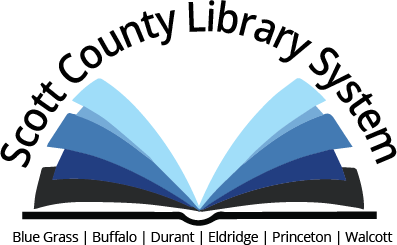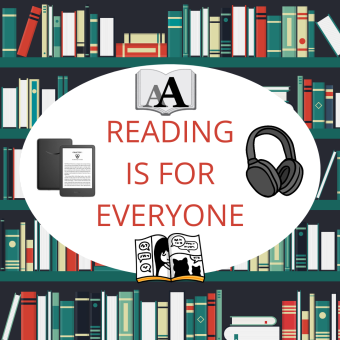Reading is For Everyone - Resources for those with Dyslexia and Print Disabilities
A print disability is a learning, physical, or visual disability that prevents a person from reading conventional print. As many as fourteen percent of students in local schools have some kind of documented print disability. The Scott County Library System wishes to expand access to all learners and is working to increase the collection of audio, large print, and graphic novels available. Thanks to a 2023 American Library Association Libraries Transforming Communities Grant, we are able to provide more materials for and about learners with print disabilities.
These websites have been recommended by families impacted by dyslexia and other print disabilities. It is not an exhaustive list, but it is a place to get started, especially for families or individuals dealing with a suspected or new diagnosis.
LEARNING MORE
Bright Solutions for Dyslexia: External Link This site includes free resources for families and information on the commercial Barton system developed by Susan Barton to aid those with dyslexia.
Decoding Dyslexia Iowa: External Link This organization includes lists of evaluators and tutors in the state of Iowa. They also provide networking opportunities in person and via social media and work on educating educators and legislators about dyslexia.
Iowa Reading Research Center: External Link This site contains research on how students read and what methods can give them more success. The caregiver hub gives families a better idea of how different children learn and how to help with assistive technology and other methods.
The International Dyslexia Association: External Link This is geared more toward professionals, but has in-depth information about dyslexia and the latest research.
RiverShare Catalog: External Link Check out books about dyslexia and other learning disabilities by doing a search in the library catalog. Many libraries also take requests for titles outside the system. Clicking on a title will bring up other recommended resources available locally.
Understood: External Link This is a resource for parents of children with any learning disorder. It is also a place to start learning about dyslexia and other language disorders.
University of Florida Literacy Institute: External Link This resource is for teachers and parents incorporating the latest research on how best to teach reading. Includes an interactive toolbox and lesson plans.
Yale Center for Dyslexia and Creativity: External LinkA website to educate parents and kids about dyslexia. It includes current scientific research.
FINDING ALTERNATIVES TO PRINT
Research within the last ten years shows that print alternatives can be key for kids who learn differently.
A team from UC Berkley found that brain maps for people reading print and listening to the same book on audio, were almost identical. So audiobooks are not “cheating”, they do in fact develop the language processing parts of the brain similarly to a print book.
A study by Project Tomorrow found that large print can be the key to growing reading skills for students of all abilities– including the ability to decode words because they are larger and have more white space around them.
Playaways at your library: External Link Playaways are small devices with one book loaded onto them. Headphones and a AAA battery are required for listening. Scott County Library System has offerings for all ages.
Read Alongs at your library: External Link Read Alongs are print books with a small audio player attached. Listen out loud, or plug in headphones while following along with the words and pictures. We also have picture books and readers for those just learning to read.
Youth Large Print at your library: External Link Large print is available for beginning readers through adults. Some read alongs also feature large print.
Ebooks and Eaudio at your library: Enlarge the font or listen to a book with the free Libby app.
Dyslexia friendly font at your library: External Link The best font can vary by reader, but there are a handful of books available in trademarked dyslexia-friendly fonts from the library.
Graphic Novels at your library External Link: When students read visual narratives, the activity in the brain is similar to comprehending text based sentences. With graphic novels, students use text and images to comprehend information, which is an abstract skill for all readers.
Dyslexic Characters in Fiction: External LinkHelp kids gain perspective on their struggles with these fiction picks featuring dyslexic characters.

